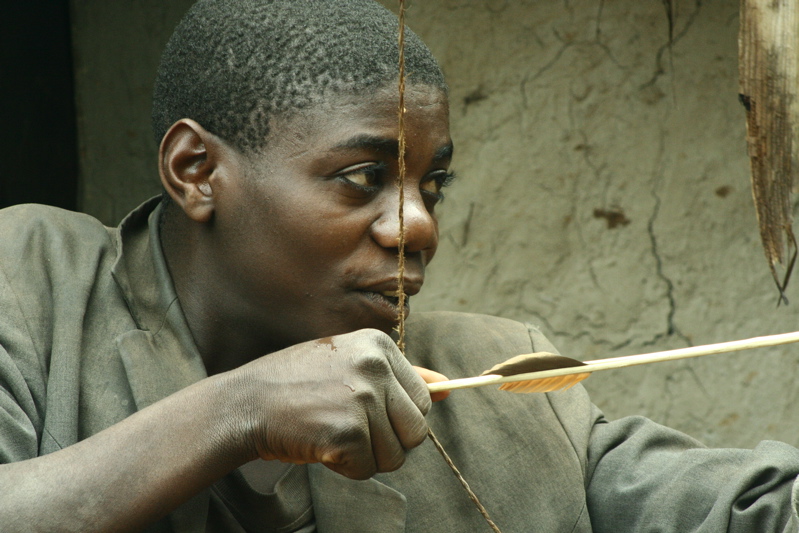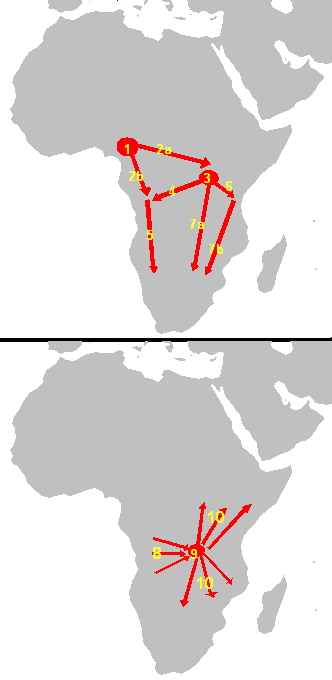|
Hutu
The Hutu (), also known as the Abahutu, are a Bantu ethnic or social group which is native to the African Great Lakes region. They mainly live in Rwanda, Burundi and the eastern Democratic Republic of the Congo, where they form one of the principal ethnic groups alongside the Tutsi and the Great Lakes Twa. Demographics The Hutu is the largest of the three main population divisions in Burundi and Rwanda. Prior to 2017, the CIA World Factbook stated that 84% of Rwandans and 85% of Burundians are Hutu, with Tutsis being the second largest ethnic group at 15% and 14% of residents of Rwanda and Burundi, respectively. However, these figures were omitted in 2017 and no new figures have been published since then. The Twa pygmies, the smallest of the two countries' principal populations, share language and culture with the Hutu and Tutsi. They are distinguished by a considerably shorter stature. Origins The Hutu are believed to have first emigrated to the Gre ... [...More Info...] [...Related Items...] OR: [Wikipedia] [Google] [Baidu] |
Rwandan Genocide
The Rwandan genocide occurred between 7 April and 15 July 1994 during the Rwandan Civil War. During this period of around 100 days, members of the Tutsi minority ethnic group, as well as some moderate Hutu and Twa, were killed by armed Hutu militias. The most widely accepted scholarly estimates are around 500,000 to 662,000 Tutsi deaths. In 1990, the Rwandan Patriotic Front (RPF), a rebel group composed mostly of Tutsi refugees, invaded northern Rwanda from their base in Uganda, initiating the Rwandan Civil War. Over the course of the next three years, neither side was able to gain a decisive advantage. In an effort to bring the war to a peaceful end, the Rwandan government led by Hutu president, Juvénal Habyarimana signed the Arusha Accords with the RPF on 4 August 1993. The catalyst became Habyarimana's assassination on 6 April 1994, creating a power vacuum and ending peace accords. Genocidal killings began the following day when majority Hutu soldiers, police, a ... [...More Info...] [...Related Items...] OR: [Wikipedia] [Google] [Baidu] |
Burundi
Burundi (, ), officially the Republic of Burundi ( rn, Repuburika y’Uburundi ; Swahili: ''Jamuhuri ya Burundi''; French: ''République du Burundi'' ), is a landlocked country in the Great Rift Valley at the junction between the African Great Lakes region and East Africa. It is bordered by Rwanda to the north, Tanzania to the east and southeast, and the Democratic Republic of the Congo to the west; Lake Tanganyika lies along its southwestern border. The capital cities are Gitega and Bujumbura, the latter being the country's largest city. The Twa, Hutu and Tutsi peoples have lived in Burundi for at least 500 years. For more than 200 of those years, Burundi was an independent kingdom, until the beginning of the 20th century, when it became a German colony. After the First World War and Germany's defeat, the League of Nations "mandated" the territory to Belgium. After the Second World War, this transformed into a United Nations Trust Territory. Both Germans and Belgians rul ... [...More Info...] [...Related Items...] OR: [Wikipedia] [Google] [Baidu] |
Rwanda
Rwanda (; rw, u Rwanda ), officially the Republic of Rwanda, is a landlocked country in the Great Rift Valley of Central Africa, where the African Great Lakes region and Southeast Africa converge. Located a few degrees south of the Equator, Rwanda is bordered by Uganda, Tanzania, Burundi, and the Democratic Republic of the Congo. It is highly elevated, giving it the soubriquet "land of a thousand hills", with its geography dominated by mountains in the west and savanna to the southeast, with numerous lakes throughout the country. The climate is temperate to subtropical, with two rainy seasons and two dry seasons each year. Rwanda has a population of over 12.6 million living on of land, and is the most densely populated mainland African country; among countries larger than 10,000 km2, it is the fifth most densely populated country in the world. One million people live in the Capital city, capital and largest city Kigali. Hunter-gatherers settled the territory in the St ... [...More Info...] [...Related Items...] OR: [Wikipedia] [Google] [Baidu] |
Tutsi People
The Tutsi (), or Abatutsi (), are an ethnic group of the African Great Lakes region. They are a Bantu-speaking ethnic group and the second largest of three main ethnic groups in Rwanda and Burundi (the other two being the largest Bantu ethnic group Hutu and the Pygmy group of the Twa). Historically, the Tutsi were pastoralists and filled the ranks of the warriors' caste. Before 1962, they regulated and controlled Rwandan society, which was composed of Tutsi aristocracy and Hutu commoners, utilizing a clientship structure. They occupied the dominant positions in the sharply stratified society and constituted the ruling class. Origins and classification The definition of "Tutsi" people have changed through time and location. Social structures were not stable throughout Rwanda, even during colonial times under the Belgian rule. The Tutsi aristocracy or elite was distinguished from Tutsi commoners. When the Belgian colonists conducted censuses, they wanted to identify the peop ... [...More Info...] [...Related Items...] OR: [Wikipedia] [Google] [Baidu] |
Tutsi
The Tutsi (), or Abatutsi (), are an ethnic group of the African Great Lakes region. They are a Bantu-speaking ethnic group and the second largest of three main ethnic groups in Rwanda and Burundi (the other two being the largest Bantu ethnic group Hutu and the Pygmy group of the Twa). Historically, the Tutsi were pastoralists and filled the ranks of the warriors' caste. Before 1962, they regulated and controlled Rwandan society, which was composed of Tutsi aristocracy and Hutu commoners, utilizing a clientship structure. They occupied the dominant positions in the sharply stratified society and constituted the ruling class. Origins and classification The definition of "Tutsi" people have changed through time and location. Social structures were not stable throughout Rwanda, even during colonial times under the Belgian rule. The Tutsi aristocracy or elite was distinguished from Tutsi commoners. When the Belgian colonists conducted censuses, they wanted to identify the peo ... [...More Info...] [...Related Items...] OR: [Wikipedia] [Google] [Baidu] |
Great Lakes Twa
The Great Lakes Twa, also known as Batwa (singular Mutwa), Abatwa or Ge-Sera, are a Bantu ethnic group native to the African Great Lakes region on the border of Central and East Africa. As an indigenous pygmy people, the Twa are generally assumed to be the oldest surviving population of the Great Lakes region. Current populations of Great Lakes Twa people live in the states of Rwanda, Burundi, Uganda and the eastern portion of the Democratic Republic of Congo. In 2000 they numbered approximately 80,000 people, making them a significant minority group in these countries. Apart from anthropological literature, the term "Twa" generally refers to the Twa of the Great Lakes region. There are a number of other Twa populations in the Congo forest, as well as southern Twa populations living in swamps and deserts where there has never been forest, but these are little known in the West. History Traditionally, the Twa have been semi-nomadic hunter-gatherers of the mountain forests li ... [...More Info...] [...Related Items...] OR: [Wikipedia] [Google] [Baidu] |
Kirundi
Kirundi, also known as Rundi, is a Bantu language spoken by some 9 million people in Burundi and adjacent parts of Rwanda, Tanzania, the Democratic Republic of the Congo, Uganda, as well as in Kenya. It is the official language of Burundi. Kirundi is mutually intelligible with Kinyarwanda, an official language of Rwanda, and the two form part of the wider dialect continuum known as Rwanda-Rundi.Ethnologue, 15th ed. Kirundi is natively spoken by the Hutu, including Bakiga and other related ethnicities, as well as Tutsi, Twa and Hima among others have adopted the language. Neighbouring dialects of Kirundi are mutually intelligible with Ha, a language spoken in western Tanzania. Kirundi is one of the languages where Meeussen's rule, a rule describing a certain pattern of tonal change in Bantu languages, is active. In 2020, the Rundi Academy was established to help standardize and promote Kirundi. Phonology Consonants Although the literature on Rundi agrees on 5 v ... [...More Info...] [...Related Items...] OR: [Wikipedia] [Google] [Baidu] |
Democratic Republic Of The Congo
The Democratic Republic of the Congo (french: République démocratique du Congo (RDC), colloquially "La RDC" ), informally Congo-Kinshasa, DR Congo, the DRC, the DROC, or the Congo, and formerly and also colloquially Zaire, is a country in Central Africa. It is bordered to the northwest by the Republic of the Congo, to the north by the Central African Republic, to the northeast by South Sudan, to the east by Uganda, Rwanda, and Burundi, and by Tanzania (across Lake Tanganyika), to the south and southeast by Zambia, to the southwest by Angola, and to the west by the South Atlantic Ocean and the Cabinda exclave of Angola. By area, it is the second-largest country in Africa and the 11th-largest in the world. With a population of around 108 million, the Democratic Republic of the Congo is the most populous officially Francophone country in the world. The national capital and largest city is Kinshasa, which is also the nation's economic center. Centered on the Cong ... [...More Info...] [...Related Items...] OR: [Wikipedia] [Google] [Baidu] |
Central Africa
Central Africa is a subregion of the African continent comprising various countries according to different definitions. Angola, Burundi, the Central African Republic, Chad, the Democratic Republic of the Congo, the Republic of the Congo, Equatorial Guinea, Gabon, Rwanda, and São Tomé and Príncipe are members of the Economic Community of Central African States (ECCAS). Six of those states (the Central African Republic, Chad, the Republic of the Congo, Equatorial Guinea, and Gabon) are also members of the Economic and Monetary Community of Central Africa (CEMAC) and share a common currency, the Central African CFA franc. The African Development Bank defines Central Africa as the Central African Republic, Chad, the Democratic Republic of the Congo, the Republic of the Congo, Equatorial Guinea, and Gabon. Middle Africa is an analogous term used by the United Nations in its geoscheme for Africa. It includes the same countries as the African Development Bank's defin ... [...More Info...] [...Related Items...] OR: [Wikipedia] [Google] [Baidu] |
Bantu Expansion
The Bantu expansion is a hypothesis about the history of the major series of migrations of the original Proto-Bantu-speaking group, which spread from an original nucleus around Central Africa across much of sub-Saharan Africa. In the process, the Proto-Bantu-speaking settlers displaced or absorbed pre-existing hunter-gatherer and pastoralist groups that they encountered. The primary evidence for this expansion is linguistic – a great many of the languages which are spoken across Sub-Equatorial Africa are remarkably similar to each other, suggesting the common cultural origin of their original speakers. The linguistic core of the Bantu languages, which comprise a branch of the Atlantic-Congo language family, was located in the southern regions of Cameroon. However, attempts to trace the exact route of the expansion, to correlate it with archaeological evidence and genetic evidence, have not been conclusive; thus although the expansion is widely accepted as having taken pla ... [...More Info...] [...Related Items...] OR: [Wikipedia] [Google] [Baidu] |
Rwanda-Rundi
Rwanda-Rundi is a group of Bantu languages, specifically a dialect continuum, spoken in Central Africa. Two dialects, Kirundi and Kinyarwanda, have been standardized as national languages of Burundi and Rwanda respectively. These neighbouring dialects are mutually intelligible, but other dialects which are more distant ones, may not be. The other dialects are spoken in DR Congo (Kinyabwisha in North Kivu, Kinyamulenge in South Kivu), Uganda (Rufumbira spoken by the Bafumbira in Kisoro District), and Tanzania; Ha, with one million speakers, is the most widely spoken. Comparison of Kinyarwanda and Kirundi Kinyarwanda and Kirundi are very similar in many aspects, but differ in several ways as well. Tonal marking Both languages are tonal languages. High and low tones (or H and L) are the essential tones and, having a phonemic distinction on vowel length, when a long vowel changes from a low tone to a high tone it is marked as a rising tone and when a long vowel changes from a ... [...More Info...] [...Related Items...] OR: [Wikipedia] [Google] [Baidu] |
Bantu Peoples
The Bantu peoples, or Bantu, are an ethnolinguistic grouping of approximately 400 distinct ethnic groups who speak Bantu languages. They are native to 24 countries spread over a vast area from Central Africa to Southeast Africa and into Southern Africa. There are several hundred Bantu languages. Depending on the definition of "language" or "dialect", it is estimated that there are between 440 and 680 distinct languages. The total number of speakers is in the hundreds of millions, ranging at roughly 350 million in the mid-2010s (roughly 30% of the population of Africa, or roughly 5% of the total world population). About 60 million speakers (2015), divided into some 200 ethnic or tribal groups, are found in the Democratic Republic of the Congo alone. The larger of the individual Bantu groups have populations of several million, e.g. the people of Rwanda and Burundi (25 million), the Bagandapeople of Uganda (10 million as of 2019), the Shona of Zimbabwe (15 million ), the Zulu ... [...More Info...] [...Related Items...] OR: [Wikipedia] [Google] [Baidu] |





